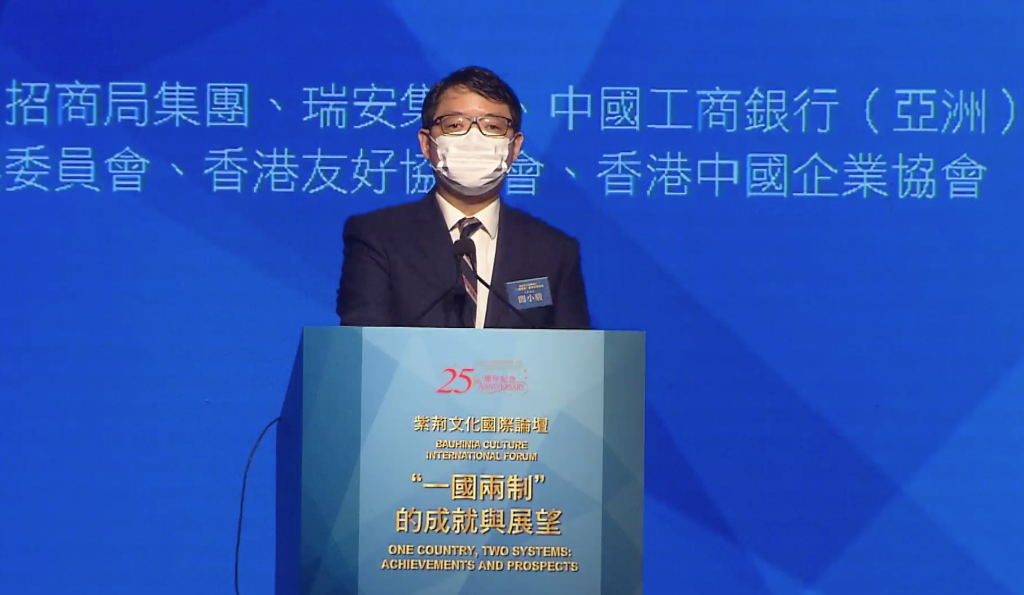A Journey Back Home:
25 Years of the HKSAR
Yan Xiaojun
The University of Hong Kong
Anniversaries are moments for reflection—remembering the past, recognising the present, and envisioning the future. The celebration of the 25th Founding Day of the Hong Kong Special Administrative Region (HKSAR) therefore necessitates reflection on the events that have taken place since 1997. Or perhaps history should be traced back to 1842, when Imperial China was defeated in the Opium Wars by the British fleet.
What has been achieved since then? What has changed, and what has remained the same after 1997? Most importantly, what might the future look like for the 7.47 million people who live in this international metropolitan city on the South China Sea?
History tells grand stories in a nuanced manner. Hong Kong was hastily included in the concessions outlined in a peace treaty to which China was forced to accede in 1842, after British warships captured Nanking following a failed military counterstrike organised by the Qing court.
This small costal town thus became a point of shame in the collective memory of Chinese nationals, a symbol of China’s traumatic past and the unbearable century of humiliation. While studying in the United States in 1925, Wen Yiduo—who later became one of modern China’s most prominent patriot
poets—wrote sentimentally of Hong Kong, personifying it as an orphaned child who was deprived of parental love and care:
I am like a yellow leopard,
Who watches the night in front of Fengge’s steps.
Mother, although my status is weak,
My position is dangerous.
Now the vicious sea lion is leaping on me,
Eating my flesh and slurping my grease;
Mother, I cried and wailed, calling you not.
Mother, let me hide in your arms! mother!
I want to come back, mother!
The handover of Hong Kong to the Chinese government in 1997 was at once a remedy for this national trauma, a symbol of a rising China’s independence and self-determination, and a substantial step towards the territorial unification of the nation.
The peaceful cooperation between China and the United Kingdom in determining Hong Kong’s post-1997 future provides an example of the possibility of solving international disputes with complicated historical origins in a conflictfree manner. This diplomatic achievement is especially commendable, as the negotiations occurred in the 1980s, when Cold War tensions were high. During this period, the more familiar way to solve political disagreement in international affairs was that superpowers threatened each other with military might and small countries were pressured to take side between the two confrontational “blocs”.
The novel political arrangement reached in the Sino-British Joint Declaration in 1984, “One Country, Two Systems”, has ensured both China’s sovereignty over Hong Kong and the continuity of the capitalist system operating in this metropolitan city, parallel to the socialist system in mainland China. The continuity of the social-economic, cultural, and legal systems of Hong Kong has helped the city to grow and flourish in the age of globalisation.
Hong Kong remains a global financial hub and plays a crucial role in facilitating the entry of global capital into the Chinese market. The resilience and strength of the post-1997 political arrangements have been convincingly demonstrated through Hong Kong’s successful handling of severe crises like the Asian Financial Crisis in 1998, the SARS pandemic in 2003, the social movements of 2014 and 2019, and the ongoing battle against COVID-19.
The opening decade of the 21st century has witnessed rapid and fundamental changes in international relations, particularly in regard to the Sino–US relationship. Both China and the United States face new challenges and pressure when dealing with each other. Frustration over changing global power structure has come primarily from the American side due to increasing uncertainty about China’s status as a potential competitor for global leadership. New measures and policies to contain China’s influence have been enacted by the United States.
In Hong Kong, consecutive social movements from 2014 to 2019 included mass unrest and dramatic episodes of violence, threatening the political order based on the Constitution of China and the Basic Law of the HKSAR.
In response, the Central People’s Government of China adopted a series of institutional measures in 2019 to safeguard national security, reform the existing electoral systems in Hong Kong, and stop the persistent cycle of local social movements by ensuring that the HKSAR is governed by patriots. These measures have solidified Chinese sovereignty and the Central Government’s overall jurisdiction over Hong Kong and have led Hong Kong into a new era of order and prosperity.
Hong Kong is now pushing forward and tackling an array of challenges that threaten people’s livelihoods. From improving standards of living to facilitating greater upward mobility for the city’s younger generations, Hong Kong is taking action to protect the social sectors most in need. Other priorities include improving the city’s public healthcare system and addressing poverty levels.
While the city does face challenges to good governance, the present level of political certainty should allow the HKSAR government, under the leadership of the newly elected Chief Executive John Lee, to improve the livelihoods of and ensure future prosperity for all who call Hong Kong home.
Hong Kong’s journey back home has been a long and tedious adventure, but the city has arrived back safely. The experiences of the last 25 years have shown that strong leadership, government capacity, and political certainty contribute greatly to the long-term stability and prosperity of the city and its people. As long as political certainty is maintained, Hong Kong will continue to develop efficiently, equitably, sustainably, and securely. We look much forward to this next phase in Hong Kong’s journey.
掃描二維碼分享到手機














